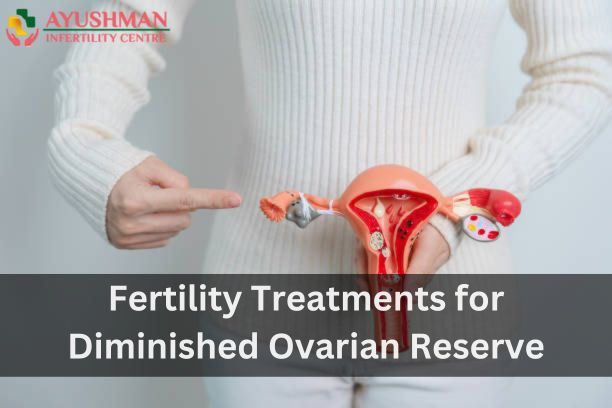
Fertility Treatments for Diminished Ovarian Reserve
If a woman is told she has a low ovarian reserve (DOR), getting pregnant might be tricky without assistance from a fertility expert. Diminished ovarian reserve means the ovary isn’t making enough high-quality eggs. This can happen due to factors like being older than 38, having certain health conditions from birth, or undergoing surgeries. If you’re facing this situation, seeking help from a fertility specialist could improve your chances of conceiving.
Diminished ovarian reserve (DOR) is mainly something to think about for women who want to get pregnant. If you have DOR but don’t plan on having a baby, hormone replacement therapy is a simple treatment option. To find out if you have DOR, you can take various tests, including blood tests like FSH, estradiol, and AMH, as well as an antral follicle count, Inhibin B levels, and considering your age.
Even if women with diminished ovarian reserve (DOR) still have regular periods, they may face challenges in releasing a high-quality mature egg each cycle. DOR, a common cause of infertility, results in a lower count and quality of eggs. Your fertility doctor will examine your egg quality test results to determine the most suitable treatment option.
Take the first step towards realizing your dream of parenthood. Contact us at +91 7303196662 or visit our site www.ayushmanivf.com today to schedule a consultation.
Treatments for Diminished Ovarian Reserve
OVULATION INDUCTION WITH IUI THERAPY
If you have a diminished ovarian reserve and want to improve your chances of getting pregnant, the first option is Controlled Ovarian Hyperstimulation (COH) followed by Intrauterine Insemination (IUI). This involves using hormonal tablets or injections to stimulate your body to produce as many mature eggs as possible during each cycle.
Your fertility doctor will monitor the progress of your eggs through pelvic ultrasounds and blood tests. Once the eggs are ready, they’ll be inseminated with either your partner’s or the donor’s sperm. The sperm is prepared using a “wash” procedure and then introduced through the cervix with a small catheter at the time of ovulation.
CONTROLLED OVARIAN HYPERSTIMULATION (COH)
For those with a diminished ovarian reserve, the second option is Controlled Ovarian Hyperstimulation (COH), followed by an Intrauterine Insemination Cycle (IUI). This process involves using a hormonal injection to encourage the body to produce as many mature eggs as possible each month.
Through careful pelvic ultrasounds and lab monitoring, your fertility doctor will track the progress of the eggs. Once they are ready, the sperm used in the treatment is often optimized for better motility, making it more effective in reaching the egg quickly. The prepared sperm is then delivered directly into the uterus, minimizing the distance it travels to fertilize the egg.
The success of this treatment depends on various factors, including your ovarian reserve blood tests, antral follicle count, and your past pregnancy history.
IVF
In Vitro Fertilization (IVF) is another option for some individuals with a diminished ovarian reserve. This treatment aims to stimulate the production of multiple eggs in a cycle, increasing the chances of finding a viable egg. During IVF, the female partner takes daily fertility shots and undergo ultrasounds to track the development of the eggs.
After reaching the appropriate size, as determined by ultrasound, the eggs are surgically retrieved from the ovary and undergo fertilization in a laboratory setting. The fertilized eggs are closely monitored until they are ready to be placed into the uterus, where they are hoped to implant. The success of IVF can vary, and for some women with diminished ovarian reserve, the poor quality of eggs may result in a success rate of less than 5%.
IVF WITH DONOR EGG
For those with a diminished ovarian reserve, another option is In Vitro Fertilization (IVF) using donor eggs, usually considered after trying other methods. This involves using eggs from another woman to help the patient become pregnant. Egg donors, typically aged 21-32, undergo screening to ensure their eggs are healthy.
Donors can be anonymous or known, including relatives. The chosen egg donor goes through the IVF process. After the eggs are retrieved, the partner’s sperm fertilizes them. The fertilized eggs are closely monitored until they are placed into the recipient female partner’s uterus, aiming for successful implantation. Success rates with egg donation are generally very high.
DONOR EMBRYOS
For those with a diminished ovarian reserve, another option is In Vitro Fertilization (IVF) using donor embryos. This involves using frozen embryos from another couple who no longer need them. Typically, these are couples who have completed the IVF process and have extra embryos.
Embryo donors, like egg donors, are usually screened for health. They can be anonymous or known, and success with embryo donation depends on various factors, including the age of the couple donating the embryos.
Conclusion
Ayushman Infertility Centre is dedicated to providing top-notch services for individuals facing the challenges of diminished ovarian reserve (DOR). With a focus on accurate diagnostics, our center offers tailored treatments, including ovulation induction with IUI therapy and advanced options like IVF, IVF With Donor Egg, and Donor Embryos. The experienced team at Ayushman ensures personalized care, utilizing state-of-the-art techniques to enhance the chances of successful conception. Trust us to guide you through this transformative journey with compassion and expertise, making your dream of parenthood a reality.
Leave a reply
Leave a reply